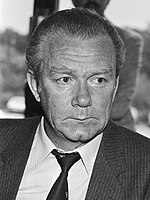Valeriy Lobanovskyi, Date of Birth, Place of Birth, Date of Death
TweetValeriy Lobanovskyi
Ukrainian football managerAbout Valeriy Lobanovskyi
- Valeriy Vasylyovych Lobanovskyi (Ukrainian: ????´??? ????´?????? ??????´?????? [w?'l?r?j lob?'n?u?s?k?j]; Russian: ????´??? ????´?????? ??????´?????; 6 January 1939 – 13 May 2002) was ? Ukrainian football manager.
- He was the Master of Sports of USSR, the Distinguished Coach of USSR, and the laureate of the UEFA Ruby Order (2002) and FIFA Order of Merit, the highest honour awarded by FIFA.
- In 2002 he was awarded the Hero of Ukraine award (posthumously), the highest Ukrainian honour, for his contribution to Ukrainian football.
- Lobanovskyi is highly esteemed for his achievements as a coach and is widely regarded as one of the greatest of all time.
- Nicknamed "the football scientist", Lobanovskyi is credited for bringing a scientific and analytical approach and strong emphasis on physical fitness and diet to the game.
- With the cooperation with Anatoly Zelentsov, a scientist from the department of physical education theory of Kyiv State Institute of Physical Education, Lobanovskyi brought an accurate system of calculation of the training process and mathematical modeling of physical load for players.Lobanovskyi is most famous for his spells managing FC Dynamo Kyiv and the USSR national football team.
- Lobanovskyi established Dynamo as the most dominant club in Soviet football in the 1970s and 1980s, winning Soviet Top League eight times and Soviet Cup six times in 16 years.
- In 1975 his Dynamo Kyiv team became the first side from the Soviet Union to win a major European trophy when they beat Hungarian side Ferencváros in the final of the Cup Winners' Cup.
- During the tournament, Dynamo Kyiv won eight games out of nine, resulting in a winning percentage of 88.88% – a record among all European main tournaments' winning club sides, matched only by Paris Saint-Germain in 1995/96.
- Lobanovskyi and the team repeated the Cup Winners' Cup success in 1986, beating Atletico Madrid in the final.
- In both 1975 and 1986, Dynamo's players (Oleg Blokhin and Igor Belanov respectively) were also rewarded with Ballon d'Or.
- During Lobanovskyi's first two stints, the team has also reached European Cup semi-finals in 1977 and 1987 and quarter-finals in 1976, 1982 and 1983.
- With the Soviet Union national team, Lobanovskyi reached the finals of the Euro 1988, losing the championship to Netherlands, and won the bronze medal at the 1976 Summer Olympic Games. After returning to Dynamo Kyiv in 1997 for the third time, Lobanovskyi led the team to another successful run in international tournaments.
- In a first full season during the third run, Dynamo reached quarter-finals of the Champions League in 1998, winning the group that included FC Barcelona, Newcastle United and PSV Eindhoven, famously beating Barcelona both times, 3:0 in Kyiv and 4:0 on Camp Nou.
- The next season, Lobanovskyi and the club ended their Champions League campaign in semi-finals, where they were stopped by Bayern Munich, and Dynamo's striker Andriy Shevchenko ended up third in 1999 Ballon d'Or voting process.
- Lobanovskyi has also won the Ukraininan league title in each of his five seasons with the club. Throughout his coaching career Lobanovskyi has won 33 official trophies, becoming the second most decorated manager of all time (behind Alex Ferguson) and the most successful football manager of the 20th century.
- He also holds several managerial records in Soviet football, including most Soviet Top League titles, most Soviet Cup wins (shared with Viktor Maslov) and most USSR Super Cup wins.
- Lobanovskyi is the only manager to win a major European competition with Eastern European club twice.
- He is one of the four managers to win the Cup Winners' Cup twice, and is one of the two (along with Nereo Rocco) to do it with one team.
- Lobanovskyi has also won the Ukrainian championship five times out of five, an accomplishment not matched by any other manager.
- Lobanovskyi is also credited for being a tutor to three Ballon d'Or winners — Oleg Blokhin, Igor Belanov and Andriy Shevchenko.
Read more at Wikipedia
See Also
- Famous People's Birthdays on 06 January, Ukraine
- Famous People's Birthdays in January, Ukraine
- Famous association football manager's Birthdays on 06 January, Ukraine
- Famous association football manager's Birthdays in January, Ukraine
- Famous association football player's Birthdays on 06 January, Ukraine
- Famous association football player's Birthdays in January, Ukraine


 Date of Birth:
Date of Birth:  Place of Birth: Kiev, Ukraine
Place of Birth: Kiev, Ukraine